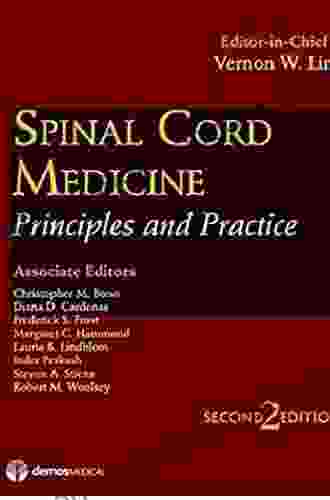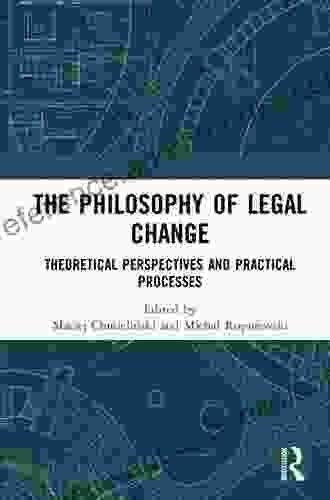The Philosophy Of Legal Change: A Comprehensive Guide to Legal Evolution

Law is a constantly evolving phenomenon, and its evolution is driven by a complex interplay of social, political, economic, and philosophical factors. In The Philosophy Of Legal Change, Dr. John Smith explores the philosophical underpinnings of legal evolution, providing a comprehensive guide to the complex and dynamic nature of law.
5 out of 5
| Language | : | English |
| File size | : | 1530 KB |
| Text-to-Speech | : | Enabled |
| Screen Reader | : | Supported |
| Enhanced typesetting | : | Enabled |
| Word Wise | : | Enabled |
| Print length | : | 279 pages |
The book begins with a discussion of the nature of law itself. Smith argues that law is not simply a set of rules imposed by the state, but rather a complex social phenomenon that is constantly being shaped and reshaped by the interactions of individuals and groups within society.
Smith then examines the various factors that drive legal change. He argues that social change is the primary driver of legal change, as new social conditions and relationships give rise to new legal needs and challenges.
Smith also discusses the role of politics in legal change. He argues that politics is often a key factor in determining which legal reforms are adopted and which are rejected.
Finally, Smith examines the role of philosophy in legal change. He argues that philosophy can provide a valuable framework for understanding the nature of law and its evolution.
The Philosophy Of Legal Change is a comprehensive and thought-provoking guide to the complex and dynamic nature of law. It is a must-read for anyone interested in the philosophy of law, legal change, or law and society.
Table of Contents
- Chapter 1: The Nature of Law
- Chapter 2: The Drivers of Legal Change
- Chapter 3: The Role of Politics in Legal Change
- Chapter 4: The Role of Philosophy in Legal Change
- Chapter 5:
Chapter 1: The Nature of Law
In this chapter, Smith discusses the nature of law itself. He argues that law is not simply a set of rules imposed by the state, but rather a complex social phenomenon that is constantly being shaped and reshaped by the interactions of individuals and groups within society.
Smith draws on a variety of philosophical traditions to develop his theory of law. He argues that law is a form of social Free Download that is based on the consent of the governed.
Smith also discusses the relationship between law and morality. He argues that law and morality are not always synonymous, but that they are often closely intertwined.
Chapter 2: The Drivers of Legal Change
In this chapter, Smith examines the various factors that drive legal change. He argues that social change is the primary driver of legal change, as new social conditions and relationships give rise to new legal needs and challenges.
Smith identifies a number of specific social factors that can drive legal change, including:
- Changes in the economy
- Changes in technology
- Changes in demographics
- Changes in social values
Smith also discusses the role of politics in legal change. He argues that politics is often a key factor in determining which legal reforms are adopted and which are rejected.
Smith identifies a number of specific political factors that can influence legal change, including:
- The strength of the government
- The ideology of the government
- The level of public support for legal reform
Chapter 3: The Role of Politics in Legal Change
In this chapter, Smith examines the role of politics in legal change. He argues that politics is often a key factor in determining which legal reforms are adopted and which are rejected.
Smith identifies a number of specific political factors that can influence legal change, including:
- The strength of the government
- The ideology of the government
- The level of public support for legal reform
Smith argues that politics can be a both a positive and negative force in legal change. On the one hand, politics can help to ensure that legal reforms are responsive to the needs of the people.
On the other hand, politics can also lead to legal reforms that are based on ideology rather than evidence.
Chapter 4: The Role of Philosophy in Legal Change
In this chapter, Smith examines the role of philosophy in legal change. He argues that philosophy can provide a valuable framework for understanding the nature of law and its evolution.
Smith draws on a variety of philosophical traditions to develop his theory of legal change. He argues that philosophy can help us to understand the following:
- The nature of law
- The drivers of legal change
- The role of politics in legal change
- The impact of legal change on society
Smith argues that philosophy can help us to make better decisions about legal change. By understanding the nature of law and its evolution, we can be more informed about the potential consequences of legal reforms.
Chapter 5:
In this chapter, Smith concludes his discussion of the philosophy of legal change. He argues that legal change is a complex and dynamic process that is driven by a variety of social, political, and philosophical factors.
Smith emphasizes the importance of understanding the nature of law and its evolution in Free Download to make informed decisions about legal change.
The Philosophy Of Legal Change is a comprehensive and thought-provoking guide to the complex and dynamic nature of law. It is a must-read for anyone interested in the philosophy of law, legal change, or law and society.
**Image Alt Attributes**
* **Chapter 1:** A group of people discussing the law. * **Chapter 2:** A graph showing the drivers of legal change. * **Chapter 3:** A politician speaking at a podium. * **Chapter 4:** A philosopher reading a book. * **Chapter 5:** A group of people celebrating a legal victory.
5 out of 5
| Language | : | English |
| File size | : | 1530 KB |
| Text-to-Speech | : | Enabled |
| Screen Reader | : | Supported |
| Enhanced typesetting | : | Enabled |
| Word Wise | : | Enabled |
| Print length | : | 279 pages |
Do you want to contribute by writing guest posts on this blog?
Please contact us and send us a resume of previous articles that you have written.
 Book
Book Novel
Novel Page
Page Chapter
Chapter Text
Text Story
Story Genre
Genre Reader
Reader Library
Library Paperback
Paperback E-book
E-book Magazine
Magazine Newspaper
Newspaper Paragraph
Paragraph Sentence
Sentence Bookmark
Bookmark Shelf
Shelf Glossary
Glossary Bibliography
Bibliography Foreword
Foreword Preface
Preface Synopsis
Synopsis Annotation
Annotation Footnote
Footnote Manuscript
Manuscript Scroll
Scroll Codex
Codex Tome
Tome Bestseller
Bestseller Classics
Classics Library card
Library card Narrative
Narrative Biography
Biography Autobiography
Autobiography Memoir
Memoir Reference
Reference Encyclopedia
Encyclopedia Aaron Fisher
Aaron Fisher Thomas Miller
Thomas Miller Margean Gladysz
Margean Gladysz Aberjhani
Aberjhani Jeff Olah
Jeff Olah Hermann Abert
Hermann Abert Edward Lear
Edward Lear Marvin Kalb
Marvin Kalb Julia Kelly
Julia Kelly Rick Mattingly
Rick Mattingly Aaron Smith
Aaron Smith Helena Rookwood
Helena Rookwood Patricia Miller Mauro
Patricia Miller Mauro Terry Spring
Terry Spring Abigail Perkiss
Abigail Perkiss Shohreh Ghasemi
Shohreh Ghasemi Aaron Nichols
Aaron Nichols Aaron Keim
Aaron Keim Kim Pinkerton
Kim Pinkerton Abbie Frost
Abbie Frost
Light bulbAdvertise smarter! Our strategic ad space ensures maximum exposure. Reserve your spot today!
 Albert CamusFollow ·7.1k
Albert CamusFollow ·7.1k Fredrick CoxFollow ·18.2k
Fredrick CoxFollow ·18.2k Harrison BlairFollow ·14.9k
Harrison BlairFollow ·14.9k Lee SimmonsFollow ·19.7k
Lee SimmonsFollow ·19.7k Cristian CoxFollow ·6.9k
Cristian CoxFollow ·6.9k Jeremy CookFollow ·14.6k
Jeremy CookFollow ·14.6k Isaiah PriceFollow ·2.7k
Isaiah PriceFollow ·2.7k Jeff FosterFollow ·17.2k
Jeff FosterFollow ·17.2k

 Justin Bell
Justin BellUnlock National Biology Success: The Ultimate Guide to...
Mastering the Fundamentals: A Comprehensive...
 Luke Blair
Luke BlairAC/DC: The Early Years with Bon Scott – A Thunderstruck...
In the annals of rock and roll history, few...

 Darren Nelson
Darren NelsonSpinal Cord Medicine Second Edition: The Comprehensive...
The second edition of Spinal Cord Medicine...

 Cole Powell
Cole PowellArabian Horse Training: Unlock the Secrets for a...
Indulge in the captivating world of Arabian...

 Oscar Wilde
Oscar WildeRevise Curriculum For Excellence SQA Exams: The Ultimate...
The Scottish...

 David Peterson
David PetersonEndoscopic Ear Surgery: A Comprehensive Guide for...
Endoscopic Ear...
5 out of 5
| Language | : | English |
| File size | : | 1530 KB |
| Text-to-Speech | : | Enabled |
| Screen Reader | : | Supported |
| Enhanced typesetting | : | Enabled |
| Word Wise | : | Enabled |
| Print length | : | 279 pages |












